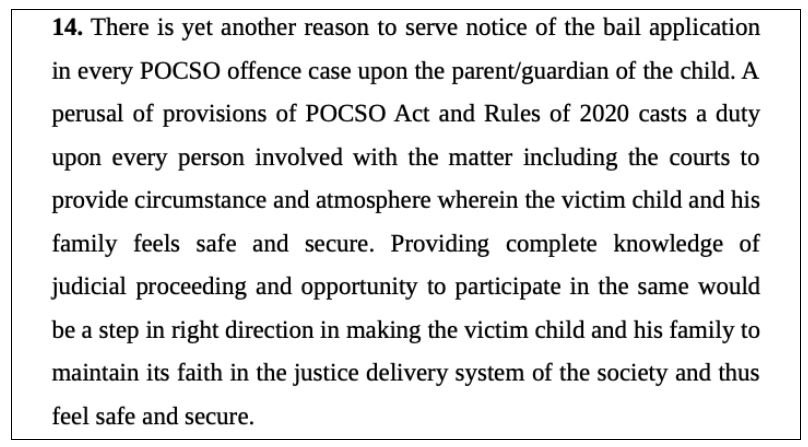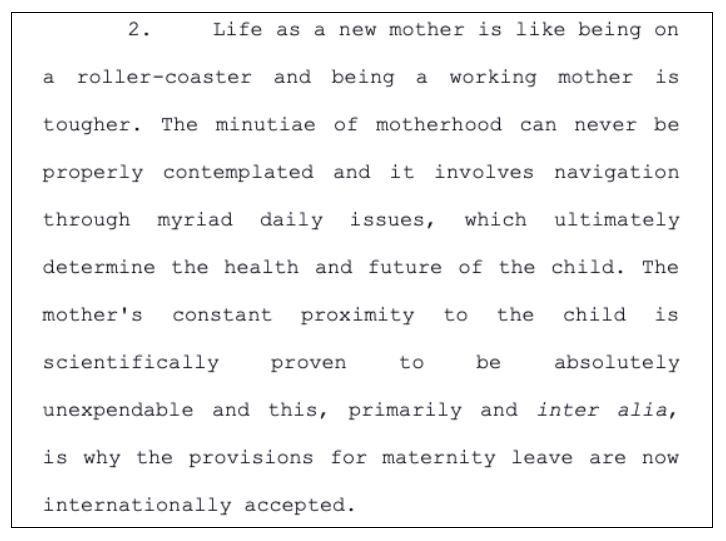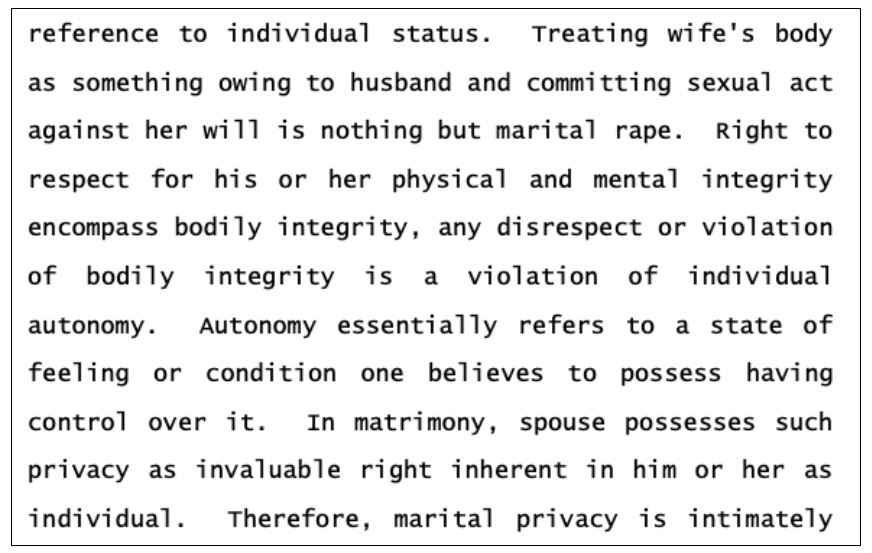In this roundup of court judgements, we look at Constitutional Courts’ remarks & directions on right to legal assistance, women’s struggle with balancing motherhood and career, martial rape as valid ground for divorce, including of teaching and non-teaching staff in frontline workers, and survey to understand the number of children out of school.
Allahabad HC: Victim’s Parent/Guardian should be notified of bail plea & their right to legal assistance in POCSO cases.
In the case Rohit vs State of U.P. Thru. Secy. Home Lko., the high court directed that the notice of bail application filing in all cases under POCSO Act (Protection of Children from Sexual Offences) shall be given to the guardian of the child victim. The notice is to be served through Investigating Officer/S.H.O. of the concerned police station and the court-mandated that it should include the details regarding the right to legal assistance in Hindi language to enable complainants to take assistance from the Legal Services Authority.
The Court was hearing a bail application under POCSO Act, wherein the applicant had initially impleaded the complainant by name as opposite party no.2, however, the Registry, raised an objection to this and the counsel for the applicant deleted the name of the complainant.

The high court was faced with the question of whether the complainant or any person on behalf of the child victim is to be made a party to the proceedings, and if any such person is to be made an opposite party in the bail application, what should be the mode of service, as the court is required to protect the child victim’s identity during investigation or trial.
The judgement mentions that the high court as well as the Supreme Court, in a number of judgments, have emphasized protecting the identity of the child in every possible manner by every person concerned. Therefore, in case the guardian or family member or any other person of the child is made an opposite party by name and notices are served upon them in the normal course, there is every possibility that the identity of the child may get revealed to the public at large.
In view thereof, it would be appropriate that notice in every case shall be served through Investigating Officer/ S.H.O. of the Police Station concerned upon parent/guardian of the child. The Investigating Officer is entrusted with protecting the identity of the child and ensure it does not get disclosed in any manner during the investigation and trial.
The judgement acknowledges that in a large number of cases, due to poverty or other similar circumstances, the parents of the victim-child are unable to engage a counsel and make a proper representation before the Court. They are unaware of their right under Section 40 of the POCSO Act, to seek the assistance of a legal counsel of their choice and if they are unable to afford a legal counsel, the Legal Services Authority is duty-bound to provide a legal counsel.
The court opined that since in many cases, the family members are unable to engage a counsel and represent in bail applications, the notice shall also include the required in the Hindi language.
Kerala HC: Emphasises on the struggle to balance motherhood and career, while setting aside a termination order for availing maternity leave
In the case of Vandana Sreemedha J vs State of Kerala & Ors., the high court deprecated the State for terminating her service as the counsellor at the Women and Child Development Department and set aside the order of termination.
The court was hearing a plea filed by Vandana Sreemedha, a Counsellor on contract at the Women and Child Development Department, after she was terminated from service allegedly for unauthorized absence. In her plea, she contended that her request for maternity leave was turned down, and to aggravate her agony, she was terminated from service when she proceeded to take the leave.
The petitioner contended that she had approached several authorities with a representation seeking maternity leave, and yet was not granted the leave. She also submitted that the Director of the Department had gone to extent of threatening to take action against the District Child Protection Officer for appointing the petitioner “without proper care”, thus implying that he should not have hired her because she had recently delivered and would be in need for leave to childcare responsibilities.
The bench of Justice Devan Ramachandran expressed that the whole incident is unfortunate and emphasized that such acts undermine the confidence and morale of women, who bravely balance their personal and official life to the best of their capacity.

In conclusion, the high court ordered the respondents to reinstate the petitioner and to reconsider her application for leave expeditiously. Although the respondents agreed to reinstate her, they stood their ground that no monetary benefits shall be granted to the petitioner for the period when she was on leave. The court left this decision to the discretion of the authorities.
Kerala HC: Upholds marital rape as a valid ground to claim divorce
In a significant judgement, the Kerala high court upheld that marital rape, although not penalised in India, is a good ground to claim divorce while dismissing a set of two appeals filed by a husband challenging the decision of the Family Court.
The high court was hearing an appeal filed by the husband against the judgment of the Family Court allowing a petition for divorce on the ground of cruelty. The Family court took cognizance of multiple instances of marital rape, mental and physical harassment, and constant exploitation for money. Therefore, it was held that the findings clearly establish a ground for cruelty warranting divorce. The family court also noted the complaints made by the women’s father before the police narrating harassment meted out to him for financial exploitation as well as to his daughter.
The high court took note of the women’s struggle as the divorce proceeding have been prolonged for more than a decade (12 years). The court also noted that in desperation for obtaining a divorce, she has also forsaken and abandoned all her monetary claims.

The judgement takes cognizance of the fact that although marital rape is alien to our penal jurisprudence, it is intimately and intrinsically connected to individual autonomy and any intrusion, physically or otherwise into such space would diminish privacy. This essentially would constitute cruelty. Merely because the law does not recognise marital rape under penal law, it does not inhibit the court from recognizing the same as a form of cruelty to grant a divorce. The high court, therefore, held that marital rape amounts to cruelty and is a ground to claim divorce.
Karnataka HC: Teaching & non-teaching staff can be included in the category of frontline workers for vaccination
In the case Radha M vs State of Karnataka, the Karnataka high court suggested that teaching and non-teaching staff of schools should be included in the category of frontline workers for the COVID-19 vaccine.
The bench of Justice B V Nagarathna and Justice P Krishna Bhat observed that vaccination would be the first step before deciding upon the reopening of schools.
Therefore, the court directed the state government to furnish district wise details of teaching and non-teaching staff of government and aided schools who have been vaccinated. However, the court clarified that the decision to re-open schools should be taken under consideration of experts’ opinions and the present situation of COVID-19 cases in the state.
Karnataka HC: Issues notice to BBMP for a door-to-door survey to find how many children are out of school
In a suo moto proceeding, the Karnataka high court directed the urban local body to conduct a door-to-door survey of the children in the age group of 6-14 years to ascertain how many children are out of school in the Greater Bangalore metropolitan area.
The court was hearing a suo-motu petition based on media reports highlighting the large number of children dropping out of school.
The high court took notice of an ongoing door-to-door survey being conducted by the Rural Development and Panchayat Raj Department of all the children in the age group of 0-18 years, which found the following:
- In rural areas, 1,26,245 children in the age group of 3-6 years are not going to school.
- In urban areas, apart from Bengaluru city, 8,781 children in the age group of 6-18 years are not going to school and around 4,800 children in urban areas have not enrolled in any school.
- Overall, 33,344 children in the age group of 6-18 years are not going to school and 9,716 children are not enrolled in any school.
The amicus curiae submitted that though under Sub Rule (1) of Rule (6) of the Karnataka Right of Children to Free and Compulsory Education Rules, 2012, a door-to-door survey was required to be carried out by the local body i.e., Bruhath Bengaluru Mahanagara Palike (BBMP), which has not been initiated.
Therefore, the court directed the Secretary of the Urban Development Department to issue a direction for BBMP to conduct a door-to-door survey on par with the door-to-door survey conducted by the Rural Development and Panchayath Raj Department.
Featured Image: Important Court Judgements


